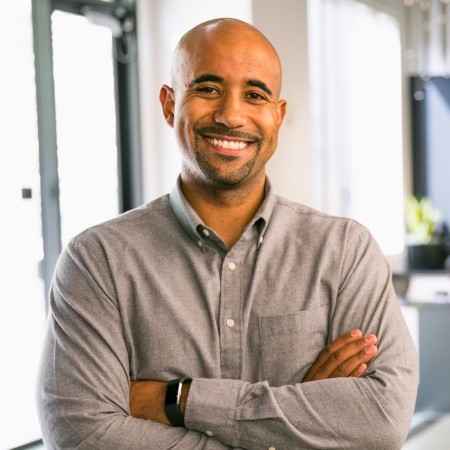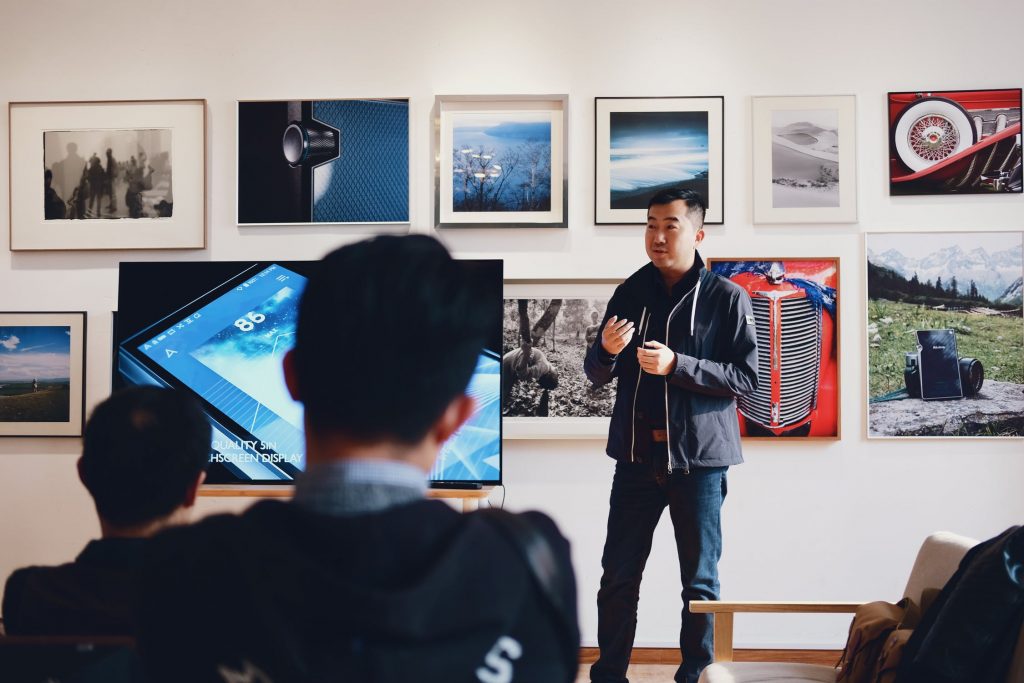 Julio Santil grew up outside of Boston and through a strong work ethic, intelligence, and relationship building skills he’s built a path to success. His motto and secret sauce? Put people first. Whether it was becoming the first in his family to graduate from college (Boston College) obtain his MBA (UC-Berkeley-Haas) or work at one of the top management consulting firms (Deloitte Consulting) Julio has used this approach to build relationships and achieve success, for himself, his teams, and his community. We chatted with Julio to learn more about his career journey, and the lessons he’s learned along the way.
Julio Santil grew up outside of Boston and through a strong work ethic, intelligence, and relationship building skills he’s built a path to success. His motto and secret sauce? Put people first. Whether it was becoming the first in his family to graduate from college (Boston College) obtain his MBA (UC-Berkeley-Haas) or work at one of the top management consulting firms (Deloitte Consulting) Julio has used this approach to build relationships and achieve success, for himself, his teams, and his community. We chatted with Julio to learn more about his career journey, and the lessons he’s learned along the way.
CareerSchooled: When you were a kid, what did you dream of doing when you grew up?
To be completely honest, the earliest childhood dream I can remember is wanting to become an NBA player. I was probably in the 7-8th grade. By Sophomore year of high school, when I hadn’t grown past 5’10”, I saw the writing on the wall. Luckily enough for me, I was a top student so going to a good college was very much in the cards. After my hoop dreams fizzled, I started thinking I wanted to do “business.” Totally naïve to what that meant, I started looking for people around me that I thought were successful. Unfortunately, I didn’t have role models in my community that worked in corporate jobs or were entrepreneurs. I had to wait until my time at Boston College to be surrounded by people from different walks of life that I could learn from.
CareerSchooled: Prior to your recent job change, you spent 8 years at Deloitte as a management consultant. How did you end up there after graduating from Boston College?
Once at Boston College, I made the choice to join the business school. I knew I didn’t want to be a lawyer, a doctor or an engineer, so I was left with business or liberal arts. I chose to major in finance because I thought that learning how money worked could lead me to a job at a great bank. My peers had aspirations of joining Goldman, JP Morgan etc., so it seemed like a reasonable path to pursue. Once I dug a bit deeper into what working at one of those companies was actually like, I scratched Investment Banker off my list of career goals. How about accounting? One of the best teachers I’ve ever had in my life, Amy Lacombe, also happened to be my Managerial Accounting teacher. I did well in her class and sought her mentorship when it came to career advice. Being the thoughtful, caring person that she was, she took the time to help me evaluate careers that spoke to my strengths. Rather than push me to become an accountant, she introduced me to careers in Consulting.
I had absolutely no idea what consulting even meant. She told that she felt I had the analytical and interpersonal skills to help companies solve problems they had trouble solving for themselves. She believed in me and that gave me the confidence to apply to all of the top consulting firms that recruited on campus. That is how I landed at Deloitte upon graduation.
CareerSchooled: Spending 7 years in consulting and at a company at Deloitte is no small feat. What were some things you did in order to help you succeed and develop while you were there?
Early on, as a wide-eyed college grad, success was really measured by work ethic and how quickly you were able grasp new concepts. That was my main focus – listen, learn, try not to ask the same question twice. After about two years as an analyst, I started to build a tool kit of both hard and soft skills that I could lean on and also began to build a reputation around. Towards the end of my 2nd year, I started to think about what was next, and that is when I began to seek out mentors. One particular mentor, Dio Diaz, was someone I always looked up to. He was two years older, also Dominican, from the Boston area and worked in Deloitte’s tech practice. One of the things he taught me early on was that in order to be successful, particularly in consulting, you had to own your career. What did that mean? It meant networking and exploring with intentionality. It meant seeking out opportunities rather than relying on the optimal project so magically fall on your lap. So I did just that – set up coffee chats with partners working on projects that seemed interesting, expressing my skillset and passion with enthusiasm.
What that quickly taught me was that it was THOSE people, the bold, that secured the roles on the best projects. I carried that mindset with me throughout my time at Deloitte and is what I think led to many of my proudest moments and experiences.
CareerSchooled: During your stints at Deloitte you also attended UC-Berkeley (Haas) for your MBA. Did you always want to get an MBA? What led you to pursue that?
Graduate school was not something I strived for. To be honest, I never really dreamt or thought that far ahead. Every major milestone in life, whether it was getting into BC or securing my first job at Deloitte, felt like I had made it. That doesn’t mean I felt complacent, but just reaching those milestones meant I had to work my ass off to be successful within those environments. That didn’t leave much room for dreaming. That started to change once I reached that 2 year milestone at Deloitte.
I began to feel like a true professional that could bring something to the table. As my confidence grew I began to think about what I wanted to do next, and that is where Dio’s mentorship really influenced me. At that time, Dio was participating in a pre-MBA program called Management Leadership for Tomorrow (MLT) which had the mission of increasing the number of underrepresented minorities in top business schools. Through his story I become intrigued at the idea of going back to school. I didn’t have anyone close to me that had received an advanced degree, not at home nor in my community, so I began seeking out those individuals to learn from them.
Dio introduced me to his mentors and I connected with Manager and Senior Managers at Deloitte that had gotten their MBA. Through their stories I began craft my own. Business School became my next milestone and I poured my nights and weekends into the application process. I was accepted into MLT, grinded away at GMAT classes, visited a dozen schools, and wrote more essays than I care to remember. It was a trying time, but honestly, I am glad it was, because it proved to me that I was all in.

CareerSchooled: Throughout your career and life, you’ve made a point of volunteering in your local community. What are some of the things you’ve done, and what’s motivated you to do this?
I am not here today if it weren’t for the Boys and Girls Club of Salem. From the 4th grade through Middle School, the club was my home. The club is where I learned to shoot a jump shot, sign up for email, open a bank account, resolve a conflict with a friend, and so much more. I owe a debt of gratitude to the club for building a foundation from which I could grow, centered around hard work, respect, and helping others along the way. Knowing that my successes were a result of an army of people who supported me, I’ve always felt an immense debt that I had to pay back. I am still very much in the red on that debt, but I know it is one I’ll never fully repay.
In 2006, with the support of my former Executive Director from the Boys and Girls Club, I joined the board of a non-profit called Youth Rising in my hometown of Salem, MA. Our work focused on instilling leadership skills through sports, arts and civic engagement for the youth in our local community, as well as in the Dominican Republic. These were kids just like me and it was one of the most rewarding experiences of my life. Although my work with Youth Rising has come to a close since moving to California, one of my passions is still mentoring of young people of color. Today I do that through informal mentorship of those that seek me out, whether it be through an alumni network or internal network at Facebook (my current employer), I make it a priority to find time for those conversations, because it was those exact conversations that guided me through my journey to Boston College, Deloitte, Haas, and to Facebook.
CareerSchooled: What advice do you have for people who came from a similar upbringing as you, who like yourself, were may not initially considered a career in consulting, an MBA, etc?
The answer to this question is a constant evolution for me. I’ve thought about it over and over again. These are the top 5 themes that bubble to the top of my list every time, in no particular order.
Crush it and be humble
Notice this doesn’t read “crush it BUT be humble.” This isn’t calling for humility in spite of being a top performer, it’s asking that you pursue excellence in all you do while demonstrating to others that don’t think too highly of yourself. If you’re like me, you’ve heard the old “work twice as hard as everyone else” line enough times, and I’ve found that to have a lot of merit (unfortunately). So yes, crush it. Work hard and be great. Get that “A”, apply for that scholarship, and go that extra mile. Doing so will put you in the conversation and in the rooms that will take you to the next level. What I’ve found, however, is that likeability and humility are what will get you into the next room – the one you REALLY want to be in. Letting your work speak for itself is a noble mantra and may work for some. For me, what I’ve found to be an important part of the equation was ‘me’ – who I am, where I’ve been, what I care about. People have decided to help me because they believed in me as a person, not just because they think I can do the job.
Find mentors, then find more
You’ve read this word several times so far, so it should come with no surprise that its in my top five. Throughout life you’ll find you need mentors with different areas of expertise, mentors that see something different in you, and mentors that can connect you in ways your previous mentors could not. This certainly doesn’t mean that you use mentors until they no longer serve you; on the contrary. Eventually you’ll find that you have a lot to offer your mentors as well. Mentorship is not one way street, so be sure to find ways to give back however you can.
Don’t forget to reach behind you
As you move through life and career, others will be looking to you for guidance, inspiration and validation that their own stories/dreams are possible. Find ways to help your community, whether that be formally or informally. I can think back to singular conversations and moments that inspired a thought in me that led me down many paths. Be that person for as many people as you can. You’ll never feel like you are doing enough – I certainly don’t. Make it a point to find ways to make yourself, and your story, available to others.
Don’t let imposter syndrome consume you
Boston College, Deloitte Consulting, Berkeley Haas School of Business, Facebook. One thing all of these places have in common is that I didn’t feel I that belonged at first. The problem wasn’t with these institutions, it was with me and my lack of confidence and feeling that I’d be “found out.” Maybe I hadn’t done enough to truly deserve the opportunity. Maybe I didn’t learn from my parents what others learned from theirs when they were children. I’ve conditioned myself to tell this voice in my head, “so what. you’re here now.” With each success and each goal achieved, that voice begins to quiet just a little, only to be reignited with the next promotion or opportunity. We belong. Remember that.

Travel
Take every opportunity you possibly can to travel. Leave your city, state, and if possible your country. Traveling the world has given me layers of perspectives on life that I’d never been able to gain at home. I look back at my undergraduate experience and wish I had studied abroad. I’ve been fortunate enough to travel more than most and I can attribute a lot of my outlook on life to those experiences. Our world is smaller than ever and you will certainly find yourself sharing a class project or work station with someone from a different background. Traveling has taught me empathy and that at the end of the day, we aren’t as different deep down as the surface my suggest.

